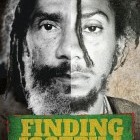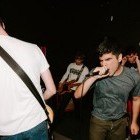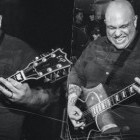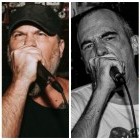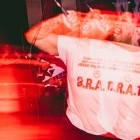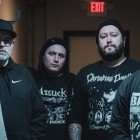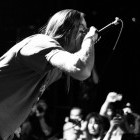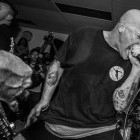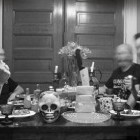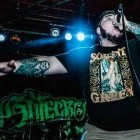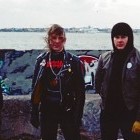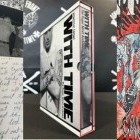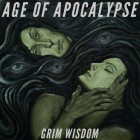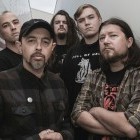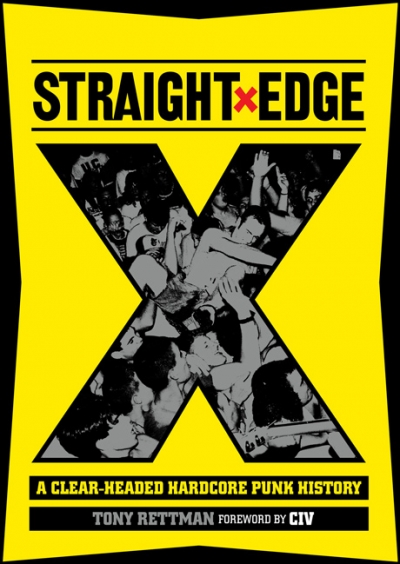
In this exclusive, the folks at Bazillion Points have blessed us with a chapter preview from, STRAIGHT EDGE: A Clear-Headed Hardcore Punk History, the new and exhaustive book from music scholar, Tony Rettman. Hitting stores on Nov. 14, the pre-order is going strong with a metal badge based on a "True Till Death" tattoo famously worn by Dave Smalley (DYS, ALL, Dag Nasty).
So, to whet your appetite, here's the "New Breed" chapter from STRAIGHT EDGE: A Clear-Headed Hardcore Punk History:
Andrew Kline (Strife, Berthold City): The start of the 1990s saw all the Youth Crew bands like Youth of Today, Bold, Gorilla Biscuits, and Judge breaking up. We got involved in hardcore at the very tail end of that. We saw Gorilla Biscuits, Judge, and Insted for the first times at some of their last shows. After that, the whole straight edge scene died down quite a bit.
Tim McMahon (Mouthpiece, Hands Tied, Search): Coming into 1990, the straight edge scene that had been so huge seemed to be falling apart rapidly. You had all the popular straight edge bands of the late ’80s breaking up, going away to college, getting out of straight edge, going more the rock route, and moving on to other things.
Walter Schreifels (Gorilla Biscuits, Youth of Today, Quicksand): I remember touring with Gorilla Biscuits in Europe and someone gave me Nirvana’s Bleach, and I was, like, “Wow.” Fugazi was happening at the same time, and that was interesting to me. Something there seemed more adult to me, and I wanted to grab onto that. I wanted to write lyrics that were more inwardly focused. I wanted to do something scary, but also poppy—and that was kind of a step on the way to Quicksand. Forming Quicksand was my reaction to the monster I helped create in hardcore.
Tom Capone (Beyond, Quicksand): We were trying to step away from hardcore, but not in a snotty way. We definitely weren’t trying to push the people we knew from hardcore away from us, not at all. We were just trying to create a new sound for ourselves.
Chris Bratton (Chain of Strength): That Gorilla Biscuits dis song “New Direction,” about Uniform Choice, has lyrics that fucking rule: “Stage dives make me feel more alive than coded messages in slowed-down songs.” What made it even radder was when Walter’s post-hardcore band Quicksand then had coded messages in slowed-down songs the following year!
Rob Moran (Unbroken): It felt like a lull for sure. The Revelation Records scene and bands like Gorilla Biscuits and Judge started to wind down just as kids my age were starting bands, so it was an odd time for straight edge. Everyone had their hands up in the air trying to figure out what to do next.
Jeff Terranova (Up Front): Straight edge had run its course. Up Front toured the country in 1991, and we certainly did not go over like during the tour we did in 1989. Quite frankly, no one cared. All the bands on Revelation became “post-core,” including Farside, Into Another, Sense Field, and Quicksand. People were looking for something fresh.
Mark Starr (Insight): I know that Insight just really started to get better at playing. We were listening to other things. We met a lot of people who only listened to straight edge music, and I never understood that. Bands were breaking up, but music in general was just changing—and I was glad it was changing. Straight edge was getting to be sterile and saturated, with really bad bands. When Insight broke up in 1990, I needed a change. I wanted to do some of the shoegaze music that I was really digging at that time.
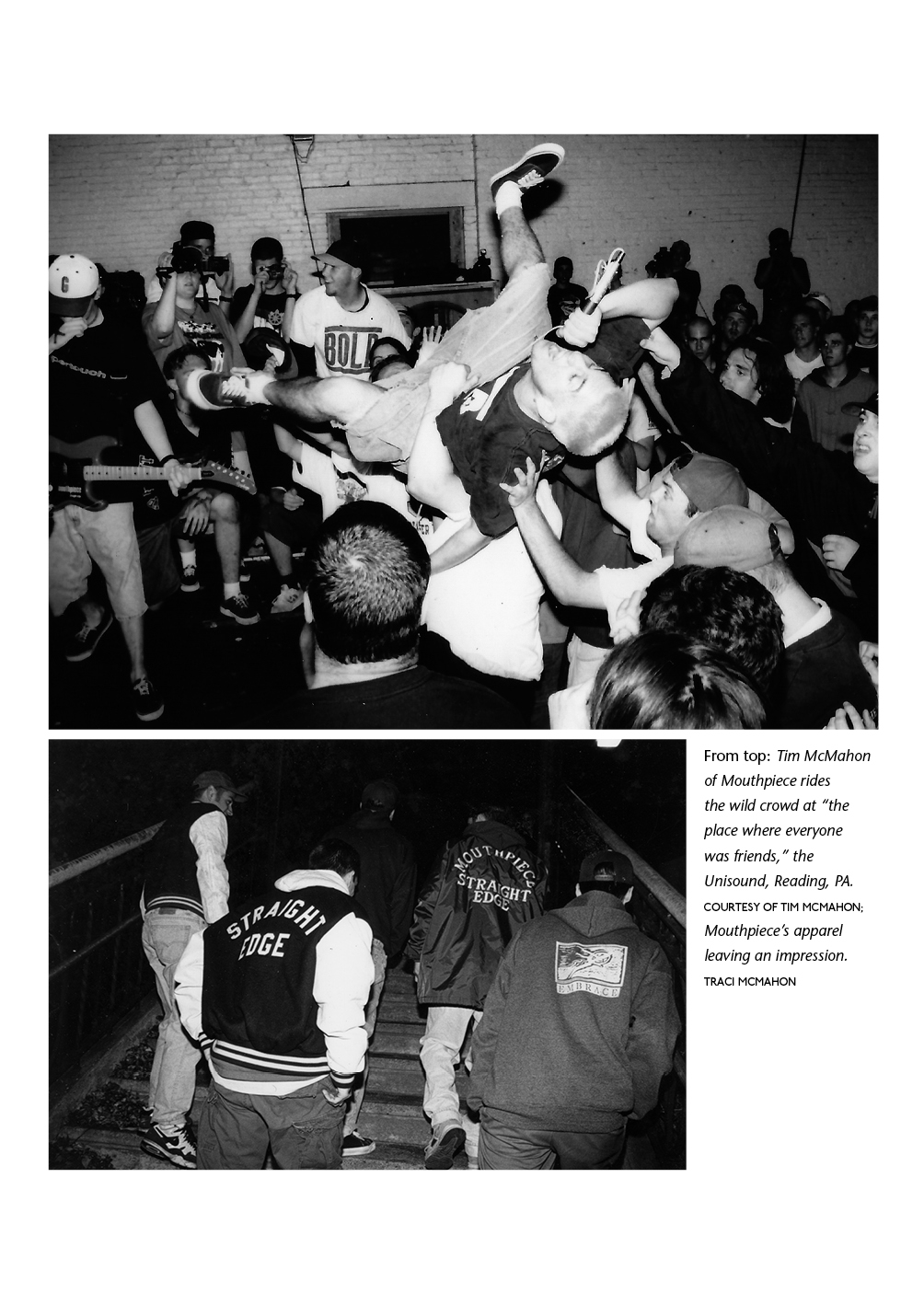
Tim McMahon: Although I was doing fanzines smack-dab in the middle of that high-point era of the late-’80s straight edge hardcore scene, I always wanted to be doing a band—not just covering the music, but doing it. Watching videos of bands playing places like the Anthrax in Connecticut and CBGB in NYC, I wanted to be opening up for those bands and be to fully immersed in that scene any way I could. Unfortunately, by the time we formed Mouthpiece in early 1990, things were on the downslide. Traditional hardcore just wasn’t cool anymore. Everyone had outgrown playing fast, and wanted to do something different.
While most bands wanted to expand their musical styles and skills by experimenting with metal and rock, we wanted to stick with what we felt the most connected to and what spoke to us. At that point, we tried to play with as many of our favorite bands as we could that were still around. Before we knew it, we were in the minority. By 1991, there just weren’t many bands playing anything that resembled that classic straight edge hardcore we grew up on. So we took it upon ourselves to push even harder and carry the torch. We weren’t ready to move on. Soundgarden was cool, but, to us, Youth of Today was still cooler.
Lins Cuscani (Break It Up): Hand on my heart, I thought Mouthpiece were the saviors of straight edge hardcore and hardcore in general in the early ’90s. They were kids of our own age that still held onto the values and beliefs of the predecessors of the straight edge scene. They also sounded a lot like Chain of Strength, which was the most amazing thing ever. By that time, Chain was gone and rumors of their non–straight edge activities were starting to unfold. To me, Mouthpiece was as relevant to us as Youth of Today and the older bands. So we supported the new bearers of the straight edge torch.
Karl Buechner (Earth Crisis, The Path of Resistance): Going into the ’90s, a lot of the bands on Revelation Records would come out in interviews saying that straight edge was cool when they were younger, but they weren’t into it anymore.
Jordan Cooper (Revelation Records): During the first year or two of Revelation starting in 1987, our goal was to document what was already happening with hardcore having a resurgence. Revelation became inextricably tied to the idea of hardcore and straight edge promoted by Youth of Today, and that was probably a conscious effort on Ray Cappo’s part. While that profile might have been the posture Ray wanted the label to have, the funny thing is that there really weren’t many bands on the label that perfectly fit that mold. I think the image mostly has to do with Ray, more than our bands. By 1989, though, Ray was disengaging and getting into Krishna, and a lot of the hardcore purist scene around Ray was having their own sort of revolution summer and going in new directions.
The label continued just documenting what was happening, never intentionally changing focus. Some of the bands pretty much signed themselves to Rev by just telling me, “This should be on Revelation,” and me just saying okay. Shelter, Quicksand, Inside Out, Burn, and CIV were pretty much like that as far as I remember. If Ray, Walter, Alan Cage, Porcell, and a few others told me that they thought we should do something, I would just listen—thankfully.
Demian Johnston (Undertow): Revelation was the quintessential hardcore label for us. But then they started putting out things like Into Another and Iceburn. Our band Undertow would cover “One Family” by Youth of Today because it was a blast, and a reaction toward that feeling slipping away. But Undertow was pretty far from what Youth of Today sounded like. We listened to a lot of Slayer, and were trying to rip off Integrity’s For Those Who Fear Tomorrow more than anything.
Greg Bennick (Trial): I remember walking around the streets of Seattle with two CDs in my hand—one by Quicksand and one by Rage Against the Machine. Both were on major labels, and both contained members of straight edge hardcore bands that were super influential on me: Youth of Today and Inside Out. I wondered what was happening. If Walter Schreifels and Zack de la Rocha went this route, what was my place and what should I be doing? These were guys we would have followed into the flames. This music was all coming from a very different mind-set than what it felt like at the Anthrax back in Connecticut, where it seemed like we were in it together and we were all going to win.
Karl Buechner: The Revelation bands were viewing straight edge more as a chapter in their lives than something that was a commitment. I guess that made sense for them. From what I understand, Ian MacKaye’s original definition of straight edge was about moderation and anti-obsession. But in the small circle of friends that I had, we viewed straight edge as a lifelong commitment.
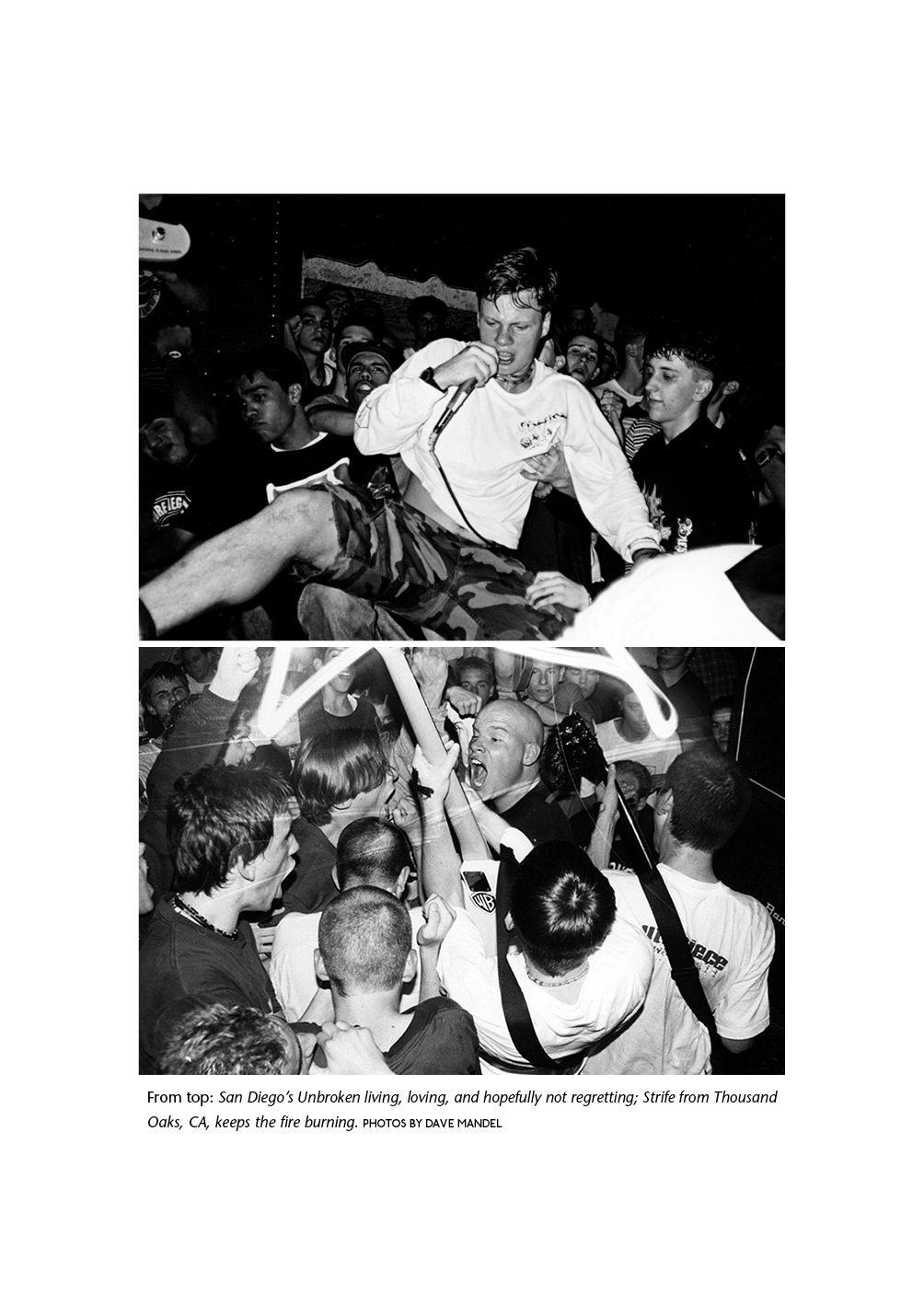
Sammy Siegler (Youth of Today, Project X, Judge): At one point, I thought straight edge and hardcore were serious fucking business. If you were straight edge, you should stay straight edge; and if you get into hardcore, you should stay part of the scene. I respect that frame of thought, because I was once like that. At the same time, there’s no rule manual. Nobody owns hardcore or straight edge to say who can stay and who can leave.
Steve Larson (Insted, A18): With the direction hardcore was taking, Insted started to feel obsolete. Our favorite bands were breaking up and moving on.
Kevin Hernandez (Insted): The scene was changing. Bands were trying to one-up each other and make money. You started hearing bands asking for guarantees for shows. They were thinking they could pay their rent through hardcore. I always said, “Get a job if you need money so bad.” Wouldn’t you make more money at a job than playing hardcore? Come on! Why would you ruin what you worked so hard on to sell out for a few thousand dollars?
Steve Larson: When we were making the last Insted record, What We Believe, Goldenvoice Productions asked if we wanted to play with 7 Seconds. We said yes, of course, and they said, “Good, if you guys are playing we can book it at the Country Club. If not, we’d have to book them at the Whisky a Go Go. They don’t draw as many people as they used to.” That was a bum-out, because they were so influential to us. History was being lost on a newer generation. We saw it happening to our idols, and we could see it happening to us. So we said, “Fuck it, let’s go out on a good note,” and we played our final show. From that point, new bands like Strife appeared. They had the spirit, but their slower, Judge-inspired sound was the new sound of hardcore.
Toby Morse (H20): Strife did make straight edge big in the ’90s, but they had a different sound than the hardcore I listened to growing up.
Tim McMahon: I remember hearing about Strife, right around the time that they were signing with New Age Records. Dave Mandel from Indecision zine would give me little reports and updates on them. He told me that Strife was basically the West Coast version of Mouthpiece. Not that we necessarily sounded the same, but that we were both young, up-and-coming straight edge bands, made up of kids similar in age that had come from the late-’80s hardcore scene. We both loved the late-’80s Revelation Records catalog. We kinda went for a more West Coast, Chain of Strength–inspired sound, while Strife went for an East Coast, Judge type of sound.
Andrew Kline: When Strife came out, the only straight edge bands on the West Coast were Outspoken, A Chorus of Disapproval, Unbroken, and us. Then in Seattle you had Undertow. We weren’t even trying to build anything; we just wanted to be a part of the hardcore scene. We were all straight edge kids who loved Youth of Today and Chain of Strength and all these other bands before us. We just thought we were doing a straight edge band to help spread this message that we felt was important. I don’t think we were consciously thinking we were going to rebuild the scene. We weren’t shit; we were little fourteen-year-old kids.
Isaac Golub (A Chorus of Disapproval, Dear Furious): Chorus of Disapproval got going during a changing of the guard, when California hardcore was in a low valley. A lot of the great clubs had closed, and a lot of the great bands were gone—or had gone straight pussy-core. The days of seeing Youth of Today, Cro-Mags, or Uniform Choice at Fender’s were over.
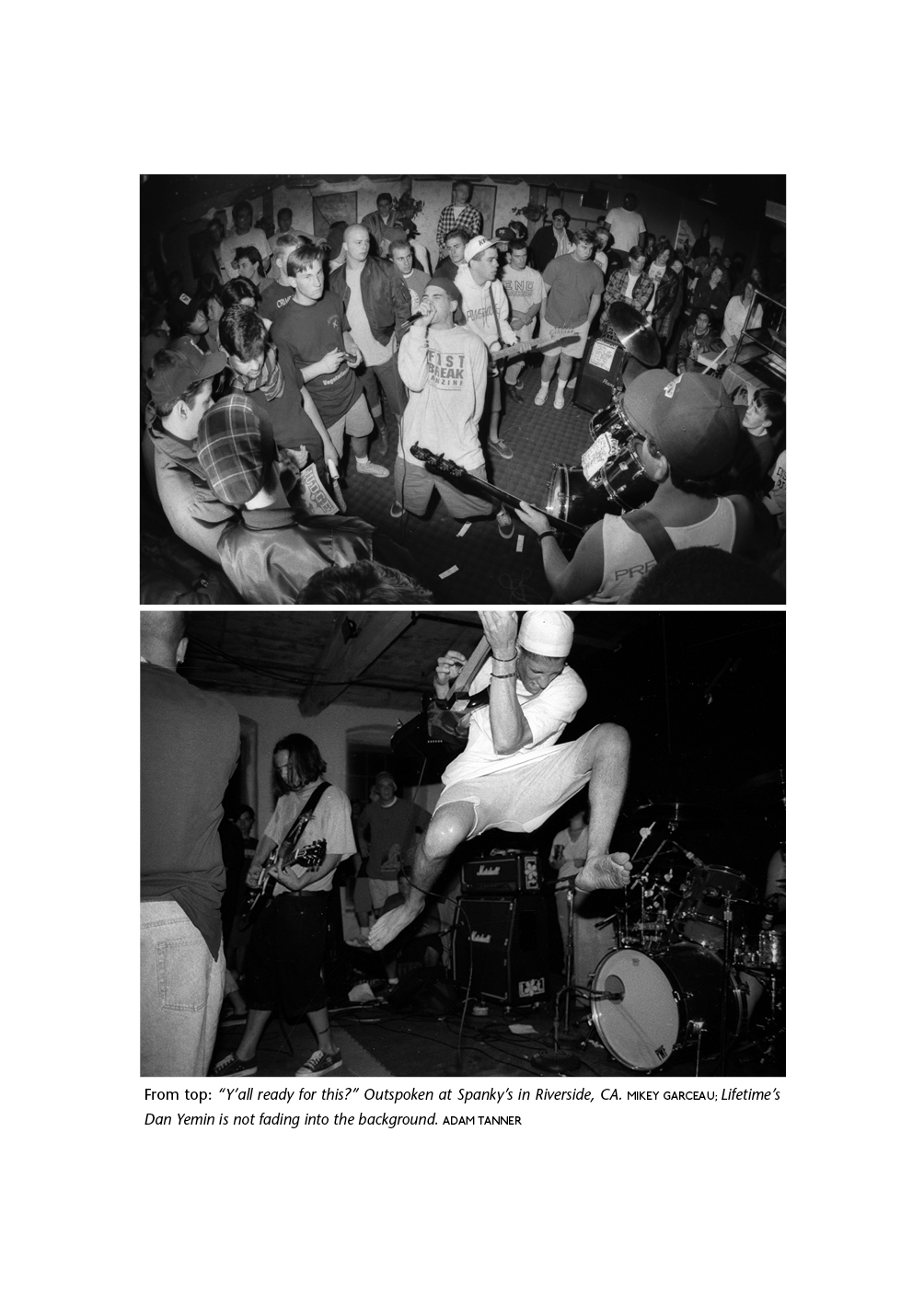
Rob Moran: Unbroken was part of a bastardization of straight edge, to say the least. We were young and didn’t know what we were doing. We put out a couple of shit records that were horrible copies of what we thought people wanted to hear. It took us a few years to sort through things and become a better band. For most new bands from that ’90 to ’93 time frame, we all took a while to get in a comfortable place with our music.
Demian Johnston: Undertow didn’t play shows in Seattle where there were four straight edge bands solid on a bill. We’d play with crust punk bands or Born Against or Bikini Kill. I felt we were more part of that world, because we all had dreadlocks and blue hair, and we’d play benefits for legalizing marijuana. It felt very different when we finally got to tour California and the Northeast, and we saw this completely different thing with bills of all straight edge bands. Undertow was definitely a band that came from straight edge, but I don’t think we ever sat around and talked about it. Occasionally we’d hear something about Walter from Youth of Today not being straight edge anymore, and we’d joke around about it, but we honestly didn’t give a shit.
Rob Fish (Ressurection, 108): Once all the straight edge bands returned home from that summer of touring in 1989, everything changed. It seemed every band, including the bigger ones, all of a sudden had grown up and grown out of straight edge and that style of music. Within a year, most of those bands were gone, or existed as a shell of themselves. The straight edge scene on the East Coast fell off the face of the earth. From that, a new group of bands came to life, such as Mouthpiece, Lifetime, Resurrection, Encounter, and Flagman. Shows went back to being in basements and garages, with mostly just the bands there.
Dave Larson (Excursion zine): Undertow, Unbroken, Strife, and Mouthpiece were all different bands. They each had their own special thing. They weren’t just New York hardcore style, or into the Washington, D.C., stuff. They were influenced by all of that, but separately they all had their own special thing.
Andrew Kline: All of a sudden, on the East Coast, you had bands like Mouthpiece, Lifetime, and Resurrection, who were doing the same exact thing that we were. They had similar influences, and they watched these bands from the late ’80s fall apart. They wanted to keep this message alive, and they knew it could happen with a new breed of bands.
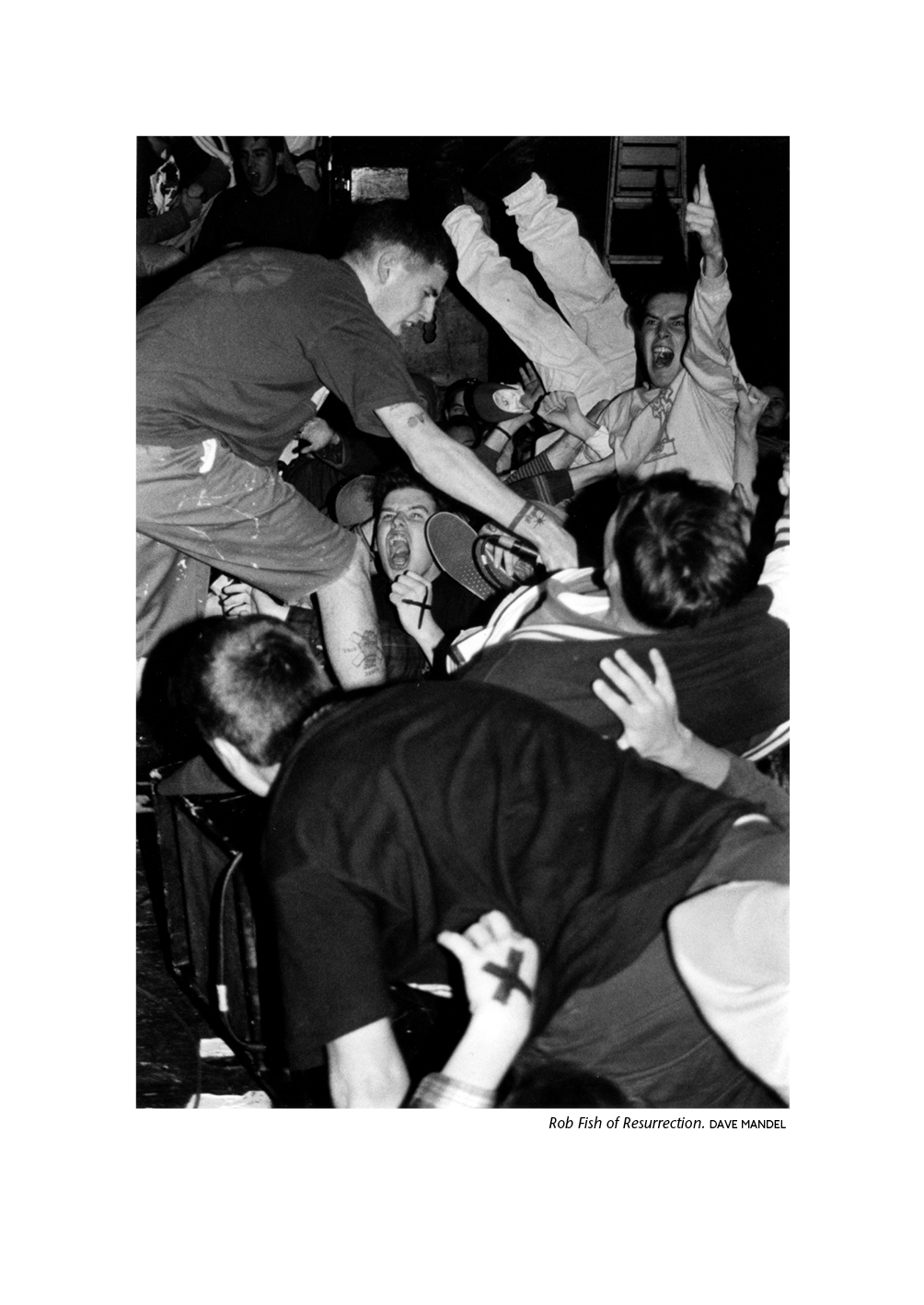
Tim McMahon: I think Mouthpiece stuck out from other hardcore in the ’90s because we were five middle-class, suburban kids that rode skateboards. We weren’t violent. We weren’t from the streets. We weren’t getting beaten up or robbed. We weren’t in any kind of serious pain. We were normal teenagers with typical teenage issues, and we never felt the need to fake anything or pretend to be something that we weren’t. We had no interest in trying to be hard, and we weren’t wrapped up in whatever trends were popping up in the early ’90s. We just did what came natural and what felt right for us. That’s one of the things that always appealed to me about bands like Youth of Today and Bold; they were who they were, normal suburban kids, nothing radical or outlandish.
Andrew Kline: None of our bands sounded alike, and every band had their own flavor. For the first time, straight edge hardcore didn’t have to fit into this box and sound a certain way. Resurrection was really noisy and influenced by Bl’ast! and Black Flag. Lifetime was more melodic. Mouthpiece held onto the influences of Chain of Strength and Youth of Today.
Tim McMahon: Mouthpiece played one of the last Release shows. I remember talking to future Resurrection singer Rob Fish at that show about how so many kids had dropped out of straight edge. I guess Rob looked at me as one of the few Jersey guys that was still carrying the straight edge flag high, so we kept in touch. Around 1990, while Rob was wrapping things up with Release and living at the Philadelphia Krishna temple, he started talking about his plans to start a new band. Rob was still super fired up about straight edge. As a reactionary statement to everyone that was falling off, Rob wanted to scream the message even louder. Naturally, I was pretty stoked on what Rob wanted to do. Considering I was in an up-and-coming band, I wanted to help any way I could. At this point Resurrection came together.
Rob Fish: The whole movement had become so bland and devoid of individuality that when people started to grow out of it, you saw most people move on all at once. Straight edge needed to diversify in respect to not just the people, but the sounds and visuals. We weren’t ready to do that. Despite having been a part of the whole scene that whitewashed itself out of existence, we felt it still had value and wanted to encourage it. Mouthpiece, sound-wise and visually, really continued to mirror the whole straight edge sound and look of the past. Resurrection and Lifetime definitely brought a different feel.
Chris Zusi (Release, Resurrection, Floorpunch, Search): With Resurrection, we purposely wanted to do something different musically and visually. We wanted to be a straight edge version of Black Flag or Bl’ast. At the time, most of the Youth Crew bands had died out or were dying a painful death. We wanted to provoke people—do a dirty, sloppy, straight edge band that felt like any song could fall apart at any minute. It was really meant to be a contrast to the tight punch of the late-’80s sound.
Tim McMahon: Maybe even slightly prior to Resurrection, Ari Katz from Enuf and Up Front was starting Lifetime. I remember talking to Ari at the first Middlesex, New Jersey, show Mouthpiece played. Like Rob, Ari was still pretty fired up about straight edge. Although Lifetime wasn’t a straight edge band, many of the members were. Ari was eager to do what he could to keep straight edge and hardcore well represented in New Jersey.
Ari Katz (Lifetime): Lifetime was definitely trying to build something back up. All the New York bands were gone, or they were playing halfheartedly with no original members. It was a weird time. Lifetime, Resurrection, and Mouthpiece all wanted to build something up together. But Lifetime was not a straight edge band; guitarist Dan Yemin was always a drinker. I would still X up when we played, just because hardcore was in such a strange place and floundering. No one knew what was going to happen next, so I was trying to keep my part in straight edge alive by doing that.
Tim McMahon: During the summer of 1991, Mouthpiece, Resurrection, and Lifetime started being asked to play a lot of shows together. Honestly, I couldn’t have been more excited. I was coming from doing a fanzine that interviewed and supported New Jersey straight edge bands like Release and Enuf. Now I was doing a band that played shows with the new bands these guys were doing. We all became friends and there was a real sense of unity and togetherness. It definitely felt like something special was happening that was reflected in the growth that we saw in the New Jersey scene.
Rob Fish: For me, the return culminated with a weekend where we played on Friday with Sick of it All, Vision, Up Front, Lifetime, Mouthpiece, and Resurrection, followed by a show on Sunday at City Gardens in Trenton, New Jersey, with Gorilla Biscuits, NOFX, and Resurrection. All of a sudden, these new bands had really strong and enthusiastic followings.
Andrew Kline: Mike Hartsfield and his label New Age Records played a huge part in that early ’90s resurgence of straight edge. He pretty much had every important band of the time on his roster: Mouthpiece, Lifetime, Resurrection, Strife, Unbroken, Mean Season, and Trial.
Tim McMahon: Our friend Jason Bush, from York, Pennsylvania, did a label. He had just rereleased the Unit Pride seven-inch and he asked Mouthpiece to record a song for a seven-inch compilation. We booked Skylab Studios around Princeton, New Jersey, where Release had recorded their final seven-inch, No Longer. Not sure exactly what happened to Jason’s plans, but we were left with a recorded song, so we took the opportunity to send it to labels and try to gain some interest. We definitely had our sights set on New Age Records, who had put out records by Pressure Release, Powerhouse, Turning Point, and Outspoken. Almost immediately, Mike Hartsfield called and told us he loved the song. He was smack-dab in the middle of putting together a seven-inch comp himself, Words to Live By, Words to Die For, with Turning Point, Outspoken, Drift Again, and Undertow. Mike said he had room on the compilation and would like to include us if we were interested. We were of course thrilled, honored, and immediately said yes.
Demian Johnston: I would say Chain of Strength True Till Death ended phase one of straight edge for me, and then phase two picked up when New Age Records started to put out a steady stream of releases. That Words to Live By, Words to Die For seven-inch compilation had Turning Point, Mouthpiece, and Outspoken; these bands still had something to say. Also, due to Mike Hartsfield and New Age Records, there was a pretty good straight edge community happening down in Southern California. We could go out there from Seattle; stay for a week at the house of someone like Dave Mandel, who did Indecision zine; play six shows; and not ever leave the immediate area.
Tim McMahon: Mike Hartsfield was the spark that connected us all. I think all our bands would have existed either way, but Mike brought us all together and helped unify us. Mike unintentionally recreated what Revelation had done a few years prior, showcasing straight edge hardcore bands from both coasts.
Mike Hartfield (Free Will, Against the Wall, Outspoken, New Age Records): The best thing about New Age is that I actually listened to and liked everything I put out. I know many label owners that need to trust A&R people to tell them what’s good and what sucks. I just put out what I liked and had fun with it. Since I am straight edge and gravitate toward straight edge music, that’s just the way it happened for the most part.
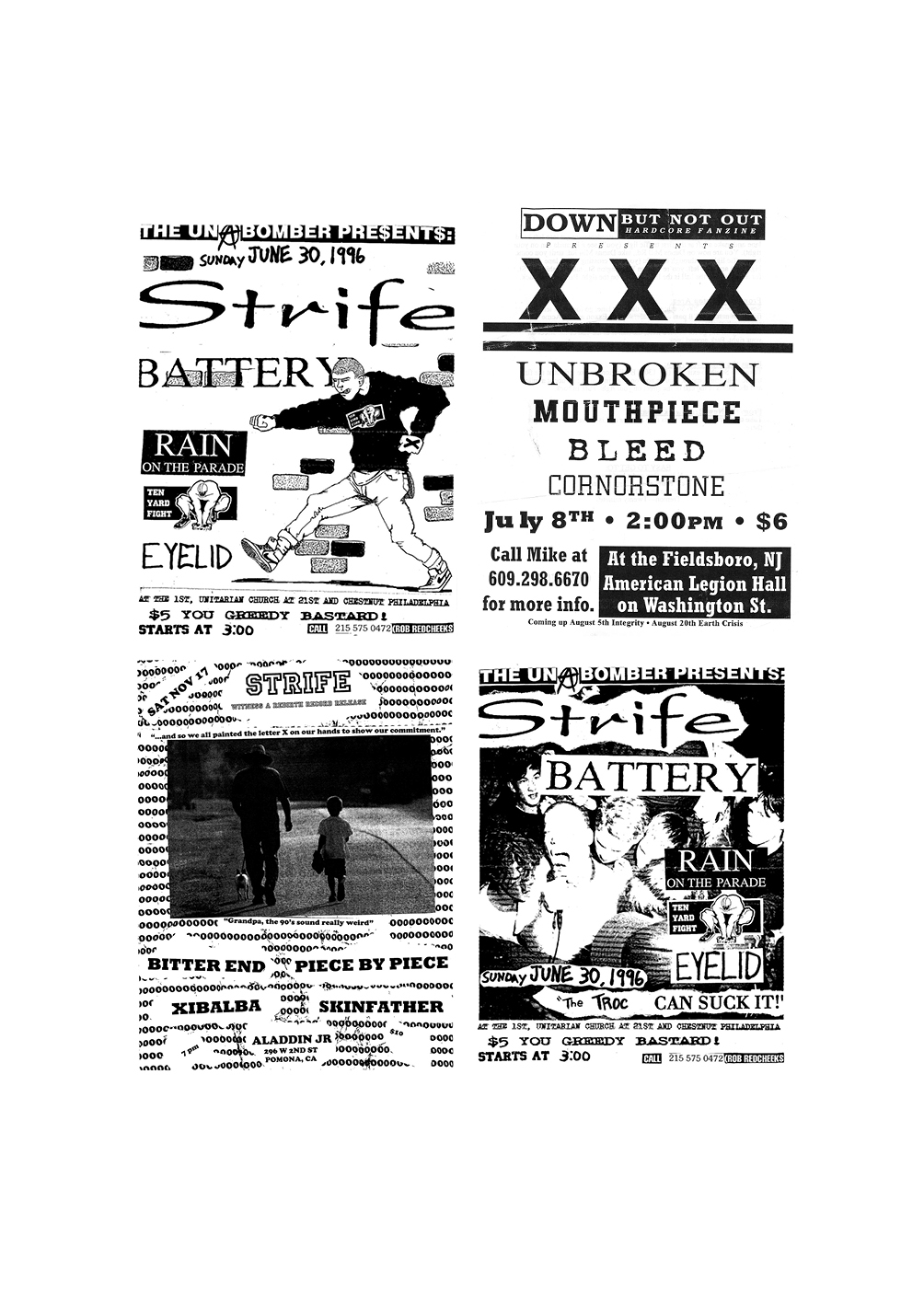
Rob Moran: While everyone was coming up and doing their own thing, Mike from New Age—to whom we owe just about everything—was part of capturing what was going on. Sure, other labels came around, some got bigger, some went away. New Age was a big deal in the ’90s, and a lot of credit goes to Mike for recording what was the perfect storm of hardcore at that time, including us, Mean Season, Strife, A Chorus of Disapproval, Mouthpiece, Resurrection, and Lifetime. He helped revive straight edge hardcore.
Tim McMahon: After Mouthpiece got on New Age, I told Mike about Lifetime and Resurrection, and I heavily encouraged him to check both bands out. Simultaneously, I was suggesting to Lifetime and Resurrection that they get in touch with Mike and send him their music. I had visions of all three of our bands releasing records on New Age, all three being from New Jersey and sort of uniting and playing together and becoming a force. I wanted to re-create our own version of Youth of Today, Bold, Judge, and Gorilla Biscuits; bands that hung out together, played together, were on the same label together, and toured together. I felt like we had something special happening, and the combination of it all coming together on an up-and-coming label like New Age was very exciting.
Everything came together as hoped. New Age signed Lifetime and Resurrection and we all released seven-inches, one right after another. Mouthpiece was New Age 8, Lifetime was New Age 9, and Resurrection was New Age 10. Then came Strife, Unbroken, and Mean Season. There was definitely the feeling of a perfect storm. All the planets were aligning, as they say. The East Coast straight edge scene was thriving, shows were getting bigger and more consistent, and the West Coast appeared to be a mirror image of that. A new breed was born and people were taking notice. New Age became the destination for early-’90s straight edge hardcore and we were right in the thick of it all.
Ari Katz: Lifetime and all the other bands on New Age Records seemed to be the ones trying to get the scene going again. It was pretty cool for the time, but it didn’t last forever.
Tim McMahon: It felt like as the 90’s moved on, a lot of the other bands we were playing with when we started, began to move in other directions. Lifetime seemed to latch on to the New Brunswick, New Jersey, punk rock scene. Lifetime was hanging and playing with bands like the Bouncing Souls, rather than the younger straight edge hardcore bands that were coming around.
Ari Katz: Lifetime started changing. We felt like we were always getting dismissed as a New Age Records band. We started realizing there was a whole other world out there of cool bands and cool scenes that weren’t based around New Age Records. It got to a point where we weren’t going to play with Mouthpiece and Resurrection anymore, as a rule! I remember telling Tim that we didn’t want to play with Mouthpiece anymore. That was really weird, and I don’t know how he took it. We were really trying to break out and forge an identity.
Tim McMahon: With Resurrection, Rob had started singing for 108 at the same time, and 108 seemed to be taking the front seat. 108 were touring, recording, and Resurrection just seemed to fade away. Not sure if it was a conscious decision or just the natural flow of things. Either way, before we knew it, Resurrection was no more. Mouthpiece did continue to play a lot of shows with 108, but the feeling was a bit different. We all got along and there were no issues, but 108 was on an entirely different level. 108 was heavily into Krishna consciousness and spirituality, and they had a very serious tone.
Although the scenes splintered and everyone went deeper into different directions, Mouthpiece continued on the same path. Nothing drastically different ever came to our music, our identity, or what we were into. Some consider that stagnation; we just saw it as consistency. The members of Mouthpiece, Lifetime, and Resurrection still got along, but the days of us all hanging out, eating food, talking shit, and acting like goofballs seemed to be in the past.
***
STRAIGHT EDGE: A Clear-Headed Hardcore Punk History will arrive in stores on Nov. 14 and can be pre-ordered directly from Bazillion Points.
Tagged: straight edge book

